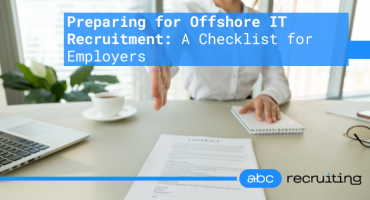So you need to recruit some top tech talent, but the local talent pool just isn't cutting it. Offshore recruiting seems like an obvious solution, right? Access to highly skilled, lower-cost resources; 24/7 support models; scalability. The benefits are clear.
Before you dive in head first though, you need to consider how you'll handle data security and legal issues. When work is being done halfway across the world by people you've never met face to face, it introduces some risks. Sensitive data could be accessed or shared improperly. Local laws may be violated unintentionally. Lawsuits or compliance problems could result.
While these challenges shouldn't deter you from offshore recruiting altogether, you do need to go in with eyes open to the potential pitfalls. With the right vetting, contracts, security controls and oversight in place you can reap the rewards of a global talent pool while avoiding the nightmare scenarios. This guide will walk you through the key steps to mitigating data and legal risks so you can build an offshore team with confidence.
Data Privacy and Security Concerns With Offshore IT Recruitment
When recruiting offshore IT talent, you have to consider data privacy and security risks. Sending sensitive data and access across borders can expose you to legal trouble if not handled properly.
For starters, make sure any service providers have strong data protection policies and security controls in place. Request regular audits of their systems and processes. If they balk at transparency, that’s a red flag.
Be extremely cautious sharing personally identifiable information (PII), protected health information (PHI), intellectual property (IP), or other confidential data. If possible, anonymize or pseudonymize any data before transferring it offshore.
Check the laws regarding cross-border data flows in all countries involved. Some have strict data localization laws limiting what can be sent abroad. Violating these can lead to legal consequences.
Have airtight data handling and privacy policies, and require all offshore recruits and vendors to sign comprehensive nondisclosure agreements (NDAs). Be very clear about how data can and cannot be used. Monitor for compliance regularly.
Consider using a controlled, secure infrastructure for offshore access rather than allowing recruits to connect remotely from unknown networks. Provide access only on a need-to-know basis.
Offshoring IT work can save money but data and legal risks must be managed. With vigilant security controls, transparency, and policies in place you can gain the benefits while mitigating the dangers. With risks addressed, offshore and domestic talent can work together securely.
Legal and Compliance Considerations for Offshore IT Recruitment
When recruiting offshore IT talent, there are a few legal issues you’ll want to keep in mind.
First, make sure any third-party recruitment firms you use comply with data privacy laws like GDPR. They should have strong data security measures in place and only collect and share candidates’ personal information with their consent.
You’ll also want to do your due diligence on candidates’ right to work status. Hiring employees who are not authorized to work in that country can lead to hefty fines and legal trouble. Check that candidates have proper work visas or citizenship status before extending an offer.
Employment contracts are another important consideration. Have a lawyer review contracts to ensure they comply with local labor laws and include protections like non-compete and IP ownership clauses. Be very clear on things like job responsibilities, compensation, benefits, and termination conditions to avoid disputes down the road.
Don’t forget about discrimination laws either. Make sure your hiring and interview processes give all qualified candidates an equal opportunity regardless of race, religion, gender, sexual orientation, disability status, or other protected characteristics. Document your hiring decisions to demonstrate they were made objectively and lawfully.
Lastly, provide new hires with an employee handbook outlining your policies, values, and codes of conduct. This helps set clear expectations from the start and reduces risks associated with workplace behavior and culture clashes. With the proper precautions taken, offshore IT recruitment can be a rewarding endeavor. But you must go in with eyes open to the legal and compliance responsibilities.
Best Practices for Mitigating Data and Legal Risks in Offshore IT Recruitment
When recruiting IT talent offshore, careful consideration of data security and legal requirements is a must. There are several best practices you can implement to reduce risks.
Perform thorough background and reference checks on candidates. Verify education, employment history, and check for any concerning past behaviors. Look for consistency and integrity.
Clearly define data access levels for different roles. Only provide access to sensitive data and systems on a need-to-know basis. This principle of least privilege helps prevent unauthorized access.
Require strict confidentiality agreements. Have candidates sign non-disclosure agreements prohibiting them from sharing any proprietary or sensitive information. Be very clear about consequences if an agreement is breached.
Invest in cybersecurity training. Educate new hires on your data security policies, protocols, and best practices. Include phishing simulation tests to strengthen awareness. Ongoing training is ideal as threats continuously evolve.
Stay up-to-date with data privacy laws. The legal landscape is complex with regulations like GDPR, HIPAA, PCI DSS and more. Understand requirements around collecting, storing, and sharing personal data to avoid penalties. Consult legal experts if needed.
Monitor systems and access regularly. Watch for unusual access patterns or downloads of sensitive data. Use data loss prevention tools to detect potential breaches early. Regular audits and spot checks also help identify vulnerabilities to address.
With the right safeguards and oversight in place, you can gain the benefits of offshore IT recruitment while avoiding undue risk. Diligence and vigilance are key. But with strong controls and monitoring, you can establish a trusted partnership with offshore talent.
So there you have it - a few key things to keep in mind when considering offshore IT recruitment to minimize data and legal risks. Vet vendors thoroughly, set clear policies and expectations, and put strong data security measures in place. Don't forget that different countries have different laws about data privacy and security, so make sure any contracts align with regulations on both sides. Offshore recruitment can be a great way to access top tech talent and cut costs, but only if you go in with your eyes open. Do your due diligence, and you'll be well on your way to building an effective distributed team without compromising security or compliance. The challenges are real, but so are the rewards. With the right approach, you can have the best of both worlds.




